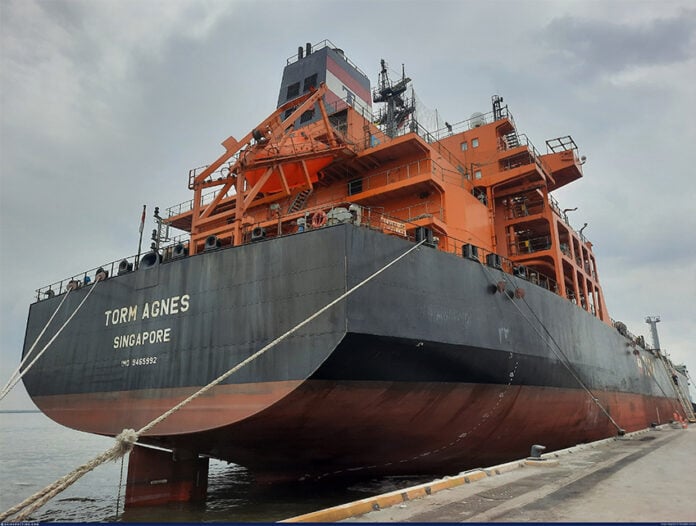In a massive, 4,600-word investigative report, the news agency Reuters detailed how a petroleum products company from Houston teamed up with a notorious Mexican cartel to smuggle US $12 million of fuel into Mexico.
The report, which traced the route of a Denmark-flagged vessel named the Torm Agnes, found that the Jalisco New Generation Cartel (CJNG) “has mastered the use of tankers to smuggle fuel to Mexico” and that “U.S. players are helping.”
Reuters identified a Houston-based company — Ikon Midstream — as a participant in the multi-million-dollar operation it describes as taking place at the Port of Ensenada in Baja California.
An attorney for Ikon Midstream told Reuters in an Oct. 18 email to stop contacting his clients, declaring that “No one will speak to your reporter!” A Torm spokesman said the company “stopped doing business with Ikon Midstream just weeks after the Ensenada incident.”
Port officials declined to speak to the news agency. Mexico’s state-owned oil company Pemex, its Tax Administration Service and the National Customs Agency also declined to comment.
More than US $20 billion worth of illegal fuel is being smuggled into Mexico by criminal gangs each year. A report issued by consulting company PetroIntelligence in May estimated that Mexico is losing US $24 million daily due to “huachicoleo” (as fuel-smuggling is known colloquially in Mexico) calculating lost tax revenues in excess of US $9.6 billion.
Reuters reported that “fuel smuggling has grown so fast that bootleg imports now account for as much as one-third of Mexico’s diesel and gasoline market,” alarming agencies on both sides of the border.
The U.S. government has offered up to US $10 million for information related to huachicoleo.
Tracing the smuggling route
Reuters described its report as the “first … full account” of the Torm Agnes’s journey which loaded fuel in Canada and discharged its payload in Ensenada and another Mexican port before beating a hasty retreat.
The tanker’s exploits — and its links to Ikon Midstream — were reported by Mexican media outlets in May but Reuters carried out a full investigation, speaking to “more than 50 people with knowledge of the racket” and reviewing cargo documents and port records.
The scheme “exploits loopholes in the vast and complex U.S. energy sector, touching a host of entities including oil majors, shipping companies and government agencies,” Reuters explained.
The Torm Agnes was transporting diesel from Canada, but by the time it reached Ensenada, “its cargo had transformed – at least on paper – into a petrochemical used to make industrial lubricants.”
The Monterrey-based company Intanza — which has no website, no social media presence and utilizes a false address — was the recipient of the fuel. Intanza is reportedly a front company for the Jalisco New Generation Cartel (CJNG).
Essentially, the operation is “a lucrative tax dodge,” often costing the Mexican treasury upwards of 50% of the cargo’s value, “by declaring the foreign fuel to be some other type of petroleum product that’s exempt from the duty.”
The CJNG is the unquestioned leader in huachicoleo, according to Mexican and U.S. security sources, and has taken it to a new level.
Of particular concern to the Mexican government are accusations that senior government officials are involved in fuel-smuggling networks. Last month, several high-ranking members of the Navy were among 14 arrested on huachicoleo charges.
President Sheinbaum weighs in
Asked about Reuters’ report at her Thursday morning press conference, President Claudia Sheinbaum said she didn’t know whether the case detailed by the news agency was related to investigations being carried out by the federal Attorney General’s Office (FGR).
“The Attorney General’s Office also does its own investigations,” she stressed.
Sheinbaum didn’t address the details of Reuters’ report, but spoke more broadly about the problem of huachicol fiscal — the evasion of the tax due on imported fuel by fraudulently declaring foreign fuel as lubricants or another product exempt from the applicable excise.
“There are several investigation files related to this matter in the Attorney General’s Office,” she said.
“Some were already presented to a judge in order to obtain arrest warrants,” Sheinbaum said.
She highlighted that “businesspeople” from the United States are mentioned in the FGR’s files, indicating that wasn’t a surprise given that fuel from the U.S. has illegally entered Mexico.
Sheinbaum said that the quantity of illegal fuel entering Mexico has declined “significantly,” and linked the reduction to “greater vigilance” in customs as well as huchicol fiscal-related arrests that have been made.
She said that the reduction in the illegal entry of fuel was reflected in an increase in the sales of state oil company Pemex and other firms that “legally” import fuel.
Sheinbaum also said that the U.S. Department of Justice is investigating fuel smuggling.
In April, a husband and wife from Utah were arrested on charges of smuggling US $300 million worth of crude oil into the U.S. from Mexico. Their adult sons were also indicted in connection with the alleged crime.
With reports from La Jornada, El Economista, N+ and Reuters
**Mexico News Daily staff writer Peter Davies contributed to this report.
